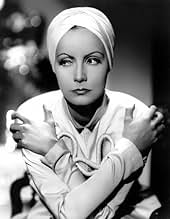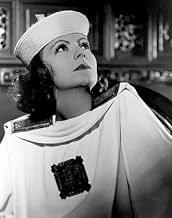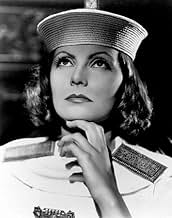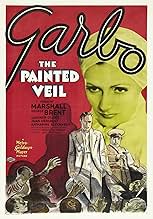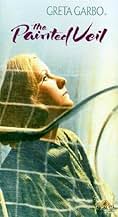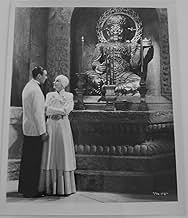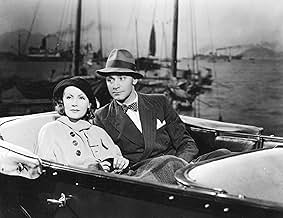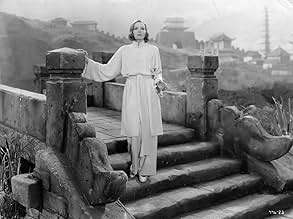AVALIAÇÃO DA IMDb
6,5/10
1,8 mil
SUA AVALIAÇÃO
Adicionar um enredo no seu idiomaA wife neglected by her husband, a medical researcher in China, falls in love with a dashing diplomatic attaché.A wife neglected by her husband, a medical researcher in China, falls in love with a dashing diplomatic attaché.A wife neglected by her husband, a medical researcher in China, falls in love with a dashing diplomatic attaché.
- Direção
- Roteiristas
- Artistas
- Prêmios
- 2 vitórias no total
Robert Adair
- Polo Player
- (cenas deletadas)
Mariska Aldrich
- German Teacher
- (cenas deletadas)
Maidena Armstrong
- German
- (cenas deletadas)
Billy Bevan
- Bridegroom
- (cenas deletadas)
Beulah Bondi
- Frau Koerber
- (cenas deletadas)
W.H. Davis
- German
- (cenas deletadas)
Vernon Dent
- Chief of Police
- (cenas deletadas)
Avaliações em destaque
Garbo is luminous in this adaptation of the Somerset Maugham story "The Painted Veil." It's a beautiful, lavish production with great direction from Clarence Brown. The story is a nice adaptation, if truncated. The stars are in especially fine form. George Brent plays a convincing cad. Herbert Marshall is in the role he always played best, as the sincere and kind, but neglected, husband. Other reviewers who noted the morality of the story are correct--this is one of those films which inspires those who watch it to be good people. The moving love story wins the viewer over by the end of the film.
The score and cinematography were lush. The Asian sets were intriguingly exotic and fun to look at. Also interesting were the title scenes at the beginning of the film, in which the name GARBO stays behind the credits. Truly indicative of the heights Garbo's star power had reached by the time THE PAINTED VEIL was released!
The score and cinematography were lush. The Asian sets were intriguingly exotic and fun to look at. Also interesting were the title scenes at the beginning of the film, in which the name GARBO stays behind the credits. Truly indicative of the heights Garbo's star power had reached by the time THE PAINTED VEIL was released!
The best adaptation of Maugham may be "The Letter," but this version of "The Painted Veil," which substantially changes his ending, is very nearly as good-- as subtle, as elegant, and as satisfying as a work of art. Both examine the profound differences and similarities that exist between passion and love, but this film goes deeper, looking at the glory that ensues when, at length, love and passion bloom together.
Much credit goes to William Daniels, who was D.P. for directors from Stroheim to Ichikawa to Bud Yorkin. His framing and silvery lighting give even greater weight to the superb performances by Garbo and the masterful Herbert Marshall. Together Daniels and director Boleslawski allow the two actors to deliver the very affecting and very adult dialog with rare dignity and feeling.
The two kitchen scenes in particular, one in the first sequence, and one near the end, are flawless, and all the better because of being parallels, and because the dialog employs the sheer force of elemental simplicity. In the second scene,when cholera-fighting Marshall finally speaks of his wife's infidelity, he humbly takes some of the blame, saying, "I went blind a little mad. But if all the men who were hurt simply quit — bad business." Garbo at last begins to understand and replies, "Being in love, and letting it smash things as I have, I thought it had the right of way, I really did." She finally realizes that passion, such as hers for her lover, can be both deeply felt and utterly shallow.
One more note about the visual genius on display. A standard cliché, fireworks,is used to suggest orgasm, but it is done as brilliantly and thrillingly as I've ever seen: three or four bursts of sparks shoot into the frame, like nothing so much as ejaculation.
Much credit goes to William Daniels, who was D.P. for directors from Stroheim to Ichikawa to Bud Yorkin. His framing and silvery lighting give even greater weight to the superb performances by Garbo and the masterful Herbert Marshall. Together Daniels and director Boleslawski allow the two actors to deliver the very affecting and very adult dialog with rare dignity and feeling.
The two kitchen scenes in particular, one in the first sequence, and one near the end, are flawless, and all the better because of being parallels, and because the dialog employs the sheer force of elemental simplicity. In the second scene,when cholera-fighting Marshall finally speaks of his wife's infidelity, he humbly takes some of the blame, saying, "I went blind a little mad. But if all the men who were hurt simply quit — bad business." Garbo at last begins to understand and replies, "Being in love, and letting it smash things as I have, I thought it had the right of way, I really did." She finally realizes that passion, such as hers for her lover, can be both deeply felt and utterly shallow.
One more note about the visual genius on display. A standard cliché, fireworks,is used to suggest orgasm, but it is done as brilliantly and thrillingly as I've ever seen: three or four bursts of sparks shoot into the frame, like nothing so much as ejaculation.
Based on a book by W. Somerset Maugham of the same name, The Painted Veil tells the tale of Katrin Koerber (Greta Garbo) who is lonely after her sister's marriage, with whom she was very close. She agrees to marry her father's research associate Dr. Walter Fane (Herbert Marshall) who takes her to China. However, he is deeply involved with his work and often neglects Katrin in favour of his work which leads her to seek love and attention from another man: Jack Townsend (George Brent).
Although I have been unsure of Garbo's acting abilities at times, she does well and truly shine in the role of the unfaithful and confused wife - a complex character which she masters with ease. Herbert Marshall does a good job of her husband caught between emotions and George Brent not a terribly good looking man was unconvincing as her lover. These two men seem to fade into the background when Garbo is on screen her exotic; cat like appearance really captures the audience despite not playing a glamorous character!
The scenery of old China is lavish and the costumes for Garbo are a pleasure to see. However, the divine Greta Garbo is the only thing that really makes The Painted Veil watchable. The plot is thin and weak but Garbo does a wonderful job and makes the melodramatic material believable and interesting. Not a great film, but watch it for Garbo.
Although I have been unsure of Garbo's acting abilities at times, she does well and truly shine in the role of the unfaithful and confused wife - a complex character which she masters with ease. Herbert Marshall does a good job of her husband caught between emotions and George Brent not a terribly good looking man was unconvincing as her lover. These two men seem to fade into the background when Garbo is on screen her exotic; cat like appearance really captures the audience despite not playing a glamorous character!
The scenery of old China is lavish and the costumes for Garbo are a pleasure to see. However, the divine Greta Garbo is the only thing that really makes The Painted Veil watchable. The plot is thin and weak but Garbo does a wonderful job and makes the melodramatic material believable and interesting. Not a great film, but watch it for Garbo.
Greta Garbo stars with Herbert Marshall, George Brent, Warner Oland, and Jean Hersholt in "The Painted Veil," from 1934, based on the novel by Somerset Maugham. Garbo plays an Austrian woman, Katrin, who grabs at the chance to marry her father's research assistant, Walter Fane (Marshall) after her sister marries and leaves home. At first, they are happy, as Katrin gets to see parts of the world she hasn't seen. Soon, however, she becomes lonely, as Walter is busy fighting a cholera epidemic.
Katrin falls for Jack Townsend (George Brent) from the British embassy, and the two enter into a passionate affair. Walter finds out; then Katrin is humiliated when she realizes that Jack cares more for his reputation than her and does not seem willing to get a divorce. Walter insists that she travel with him as he goes deeper into China to fight the epidemic; she realizes he just wants her to get sick and die.
Garbo is incredible in this film - warm, sweet, and flirtatious in the beginning, and rising to the dramatic challenges later, she gives a beautifully layered, sympathetic, and powerful performance. Marshall is very good, as is the rest of the cast - but Garbo just walks away with the whole thing. A very unusual presence and talent, very passionate and committed. It's such a shame that she didn't pursue opportunities for films in Europe after the war.
Also, the Chinese atmosphere (totally MGM backlot) feels very authentic.
This film ends differently from the 2006 version. Though I liked the 2006 version, it lacks the magic of this one. Magic, spelled G-a-r-b-o.
Katrin falls for Jack Townsend (George Brent) from the British embassy, and the two enter into a passionate affair. Walter finds out; then Katrin is humiliated when she realizes that Jack cares more for his reputation than her and does not seem willing to get a divorce. Walter insists that she travel with him as he goes deeper into China to fight the epidemic; she realizes he just wants her to get sick and die.
Garbo is incredible in this film - warm, sweet, and flirtatious in the beginning, and rising to the dramatic challenges later, she gives a beautifully layered, sympathetic, and powerful performance. Marshall is very good, as is the rest of the cast - but Garbo just walks away with the whole thing. A very unusual presence and talent, very passionate and committed. It's such a shame that she didn't pursue opportunities for films in Europe after the war.
Also, the Chinese atmosphere (totally MGM backlot) feels very authentic.
This film ends differently from the 2006 version. Though I liked the 2006 version, it lacks the magic of this one. Magic, spelled G-a-r-b-o.
As a fan, and user, of old Leica cameras, this film interests me by a scene where Walter Fane (Herbert Marshall) shows Katrin (Greta Garbo) how to operate her Leica camera. This is a black Leica Model II with Elmar 5cm lens, in a leather everyready case. This model was issued firstly in 1932. Walter points out the shutter-speed dial on the camera, then uses the camera to take a photo of a family having a meal ("banquet", he calls it). Here, there is an interesting Special Effect which recreates the view through the camera rangefinder: a somewhat lightened disc in the center of the frame, and within that the doubled image moving into one as the Leica is focused. This effect is a fascinating detail that would have taken a lot of work to produce. After that, Katrin somewhat carelessly handles the camera by simply holding it by its strap instead of putting the strap safely around her neck. She apparently holds it this way for some seconds over the side of the ship, risking loss of the camera. She is also seen holding the camera tucked up under her left arm - also not a secure spot for such an expensive piece of apparatus. Fans of Garbo will notice that it is during this "camera lesson" that the actress gives some of her warm, natural smiles. This scene contains one of the best "appearances" of the Leica in cinema, in the 1930s. The March 1935 issue of "Leica News and Technique" p.7 (E. Leitz, London), noted the movie, saying that Herbert Marshall was himself a Leica user - the scene probably reflected his enthusiasm for the camera.
Você sabia?
- CuriosidadesRainha Christina (1933) and O Véu Pintado (1934) were both huge hits in Europe (making twice their budget in the UK alone), but were underwhelming US successes.
- Erros de gravaçãoA box is marked "Scotch Whiskey", which is the American spelling of whiskey. In the United Kingdom, however, it is spelled with no 'e' and is simply "whisky". Therefore, had the whisk(e)y been imported directly from Scotland, it should have had the 'whisky' spelling.
- Citações
Katrin Koerber Fane: [after Townsend impulsively kisses Katrin] How could you?
Jack Townsend: I could.
- Cenas durante ou pós-créditosGreta Garbo's name in the opening credits uses a font that forms the same Gothic arch in the letters as is used in W. Somerset Maugham's symbol. The other credits also use this to a lesser extent.
- ConexõesFeatured in Terra dos Deuses (1937)
- Trilhas sonorasBridal Chorus (Here Comes the Bride)
(1850) (uncredited)
from "Lohengrin"
Written by Richard Wagner
Played as background music in the wedding scene
Principais escolhas
Faça login para avaliar e ver a lista de recomendações personalizadas
- How long is The Painted Veil?Fornecido pela Alexa
Detalhes
Bilheteria
- Orçamento
- US$ 947.000 (estimativa)
- Tempo de duração
- 1 h 25 min(85 min)
- Cor
- Proporção
- 1.37 : 1
Contribua para esta página
Sugerir uma alteração ou adicionar conteúdo ausente

